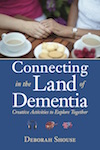Posts Tagged ‘music therapy’
Three Top Tips for Tuning into Singing: Insights from Finland
Mom was staring into space, oblivious to my brilliant smiles and cheerful conversation. So I started to sing, just to occupy myself. I chose songs Mom liked, such as “Oh What a Beautiful Morning,” “A Summer Place,” and “You are My Sunshine.” Normally, I felt a little down when I didn’t really get to connect with Mom during my visits. But after a half-hour of being a one-woman show, I felt uplifted and energized. And Mom seemed to be making a sound much like humming.
Singing was often a part of my time with Mom. I’ve always felt happy after “making a joyful noise.” Now a study from Dr. Teppo Sarkamo and his colleagues in Helsinki, Finland, explains why.
Dr. Sarkamo’s research found that “regular musical activities can have an important role in maintaining cognitive ability, enhancing mood and quality of life” for people living with mild to moderate dementia. These activities also promote the well being of care partners and offer a beneficial leisure activity for the person living with dementia and the care partner.
Invite Out Your Inner “American Idol”
You don’t need special musical abilities to benefit from listening to music or singing. The research shows that incorporating simple musical activities in daily care is “a cost-efficient way for offering emotionally, cognitively stimulating, and enriching musical experiences.”
The study’s music therapist, Sari Laitinen, kindly offered these ideas for care partners and the person living with dementia.
- First, reserve enough time together to spend with the music. The main thing is feeling peaceful together. When singing, choose the songs together from a songbook. In our research project, we prepared a song booklet of our own for the participants, which mostly included well-known Finnish singe-a-long songs from their early years: childhood, teenage years and early adulthood. The care partner can begin by humming a melody first, and if their partner recognizes the song, they can start singing it together. Usually, the partner knows the lyrics “by heart” and their memory retrieval is quite automatic.
- Usually the songs bring about personal, autobiographical memories related to the life era and events when the songs were popular. Allow the reminiscence of your partner to proceed on its own time and terms, accepting the stories and not immediately correcting if the people or places happen to be incorrect. You want a mutual feeling of telling each other important things about life. It is all about acceptance and the understanding that something important is shared. The feeling of being understood helps to cope with life.
- Listening to music is based on the same principles as singing together: the care partner can suggest some records he/she thinks are meaningful and see what happens. When asking your partner to choose the record, it is good to have some LPs or CDs with a photo of the artist on the cover. Again, it is nice to have a quiet place for the listening and time to share the stories and the feelings that the music evokes. It is good to keep in mind that although the songs are familiar from a long time ago, the experience of music is always “here and now”. By experiencing the music together and by being sensitive to the ”reactions” (emotions, thoughts, memories) evoked by the music, the care partner can offer acceptance and validation of the experiences, the feeling of being understood. Given time, this can lead the discussion from the reminiscence of old times to themes that are important now, such as acceptance of the lived life, mourning of losses, joy in the moment, feeling of vitality, strengthening the feeling of life and so on.
For more information, visit: Singing is beneficial for memory and mood especially in early dementia
Clinical and Demographic Factors Associated with the Cognitive and Emotional Efficacy of Regular Musical Activities in Dementia, Teppo Sarkamo, Sari Laitinenb, Ava Numminenc, Merja Kurkib, Julene K. Johnson, and Pekka Rantanene a,

